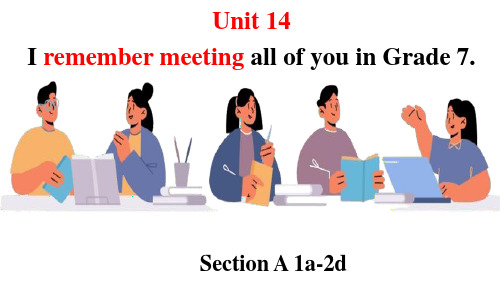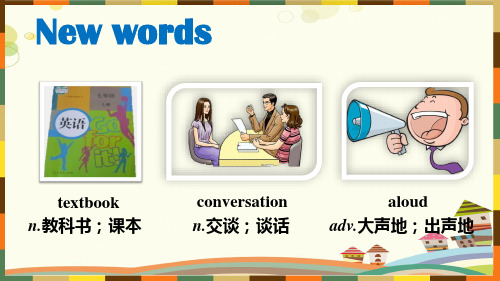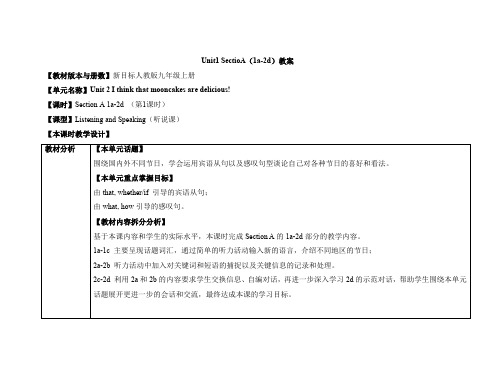英语人教版九年级全册Unit7 SectionA1a-2d
人教版英语九年级 Unit 14 第1课时(A 1a-2d)

standards of a strict teacher
_d_ Frank b. remembers losing a schoolbag _c_ Sarah c. remembers meeting this group of friends _a_ Peter d. has enjoyed every year of junior high
Make conversations with your partner.
—What do you remember doing?
—I remember _w_i_n_n_in__g__ _a_p__ri_z_e___.
memory
—What do you remember doing?
—I remember _p__u_t_ti_n_g____ _o_n__a__p_l_a_y________.
Let’s discuss
1. What kind of party do you think it is?
Well, junior high school days are over. Do you have any special memories?
Is it a welcome party
or a graduation party?
2.能听懂有关回顾过去相关话题的词汇、句子的英文 表达,并能捕捉有效信息独立完成相关听力任务。
3.通过口语输出,能用一般过去时和现在完成时谈论 过去的经历。
Warming up
Junior high school days will be over soon. Do you have any special memories at junior high school?
人教版九年级全一册英语同步培优Unit 1 课时1 Section A(1a-2d)

二、用括号内所给词的正确形式填空。 6. The doctors and nurses tried their best to save all the
_p_a_t_i_e_n_ts__(patient).
返回
7. This magazine is very popular and it has a lot of __r_e_a_d_e_r_s__(read).
返回
五、补全对话。 A: You look sad. 21. W__h__a_t _is__th_e__m_a_t_t_e_r/_W__h_a_t_i_s_t_h_e___
_tr_o_u_b__le_/_W__h_a_t _is__w_r_o_n_g_/_W__h_a_t'_s_u_p________________? B: My parents don’t allow me to play outside on
人教河南 九年级全
UNIT 1 How can we become good learners?
课时1 Section A(1a-2d)
习题链接
提示:点击 进入习题
基础巩固练
答案显示
1 textbooks
6 patients
11 At first
2 sentence
7 readers
12 takes time
返回
19. You will feel more comfortable with more skill when you are in___B___.
【A点. C拨o】mf根or据t Z原on文e 句子As we stBep. Lineatorntihneg lZeoanrneing zCo.nDe,awngeewr Zilol ngeet more comfortDab. ClehwaliltehngtheeZsokniells gradually and we’ll start to move into the comfort zone.可知答案。
英语人教新目标九年级全一册Unit 1 Section A (1a-2d)修改2019

I learn (English) by making word cards
by reading the textbook
I learn (English)
by listening to tapes
I learn (English) by asking the teacher for help
something you enjoy every day. The more you read, the faster you'll be.
2d Role-play the conversation.
1. What are the names of the girl and boy in the conversation? They are Annie and Jack.
2. Why is Jack nervous? Because he has to finish reading a book and give a report next Monday.
3. What’s Annie’s advice for Jack’s problem? Just read quickly to get the main ideas at first and try to guess the words’ meaning.
2.(1).对做... 的方式状语提问用“how”。 (2).通过/依靠做... 来..., 用 by +doing.
3.(1).study for a test (2).work with friends/a group (3).ask sb. for help/money/advice (4).be happy to do sth.
人教版英语9年级全册Unit2_SectionA(1a-2d)教案

1.学生是否能听懂目标词汇与基本句型。
2.学生是否能用目标词汇回答问题。
3.学生是否能通过听音模仿朗读课文
DELC6
3
深度加工知识
Step 4
Post-
listening(听后)
(5 mins)
Step 5
Pre --listening(听前)
(3mins)
1c Talk about the festival in 1a.
A: I guess the food was delicious, right?
Ss make their own conversations with his or her partner. Then let some pairs act out their conversations.
创编新的对话,巩固拓展学生词汇及语言能力。
The Mid-Autumn Festival
The Chinese Spring Festival
The Water Festival
教授核心句型
Ilike…best, I think that…
教授核心短语
The Lantern Festival
The Mid-Autumn Festival
The Chinese Spring Festival
friends.
3.Wu Ming visited hisrelatives/ friends/
Classmates.
4.Wu Ming liked eating out/ shopping/
The Dragon Boat Festival best.
2.Check the answers wie exercises together.
Uni7 Section A 1a-2d课件 人教版八年级英语下册

800
650
520,000
2
Question time:
36,500, 435, 478. 23 ↓ ↓ ↓ ↓
billion十亿)
million百万
thousand 千
Can you read these numbers? 8,844.43 6,671 1,025 9,600,000
Fill in the blanks.1.这张桌子两米长,一米宽。 and ___________________2.这座山有1500米高。3.这栋楼120米高。4.这本字典有五厘米厚。5.这个湖有多深? 125米深。
The table is __________________
Notes
1. as +原级+ as 和...一样.... 2. 比较级+than 比...更3. the 最高级 of..../in .... “...中最....” the second/third 最高级adj. +n. 第几...的... one of 限定词 +最高级adj. +n(pl.) 最...之一 4. much/a lot/far/a little/a bit/even/still + 比较级5. This hole is not as/so deep as that one. 不如...=>This hole is less deep than that one.=>That hole is deeper than this hole.6. The Nile is the longest river in the world. =>The Nile is longer than any other river in the world. the other rivers
英语人教新目标九年级全一册Unit 1 Section A (1a-2d)改

4. _c_ What about reading aloud to practice
pronunciation?
5. _a_ Have you ever studied with a group?
注意:never, ever一般置于助动词have/has 之后,过去分词之前。
现在完成时与一般过去时都和过去发 生的事情有关,但是现在完成时强调这 一动作与现在的关系,如对现在产生的 结果、影响等,而一般过去时只表示过 去的事实,不表示和现在的关系。
e.g. I have just been to London. I went there last month. 我刚去过伦敦,是上个月去的。 I have been to the science museum many times. I went there on our last summer vacation. 我已经去了科学博物馆很多次。 去年暑假我还去了呢。
Jack: Annie, I’m a little nervous. I have to finish reading a book and give a report next Monday.
Annie: That doesn’t sound too bad. Jack: But I’m a very slow reader. Annie: Just read quickly to get the main ideas.
by + v.-ing
常常表示手段、方式或方法,可以用来回答how引导的特殊疑问句。
Unit 10(Section A 1a-2d)九年级英语全一册(人教新目标Go For It!)
While-listening
Watch and check your answers in 1a.
While-listening
1b Listen and check your answers in 1a.
Countries
Customs
1. ___c__ Brazil
2. ___b__ the United States a. bow
3. ___a__ Japan
b. shake hands
4. ___b__ Mexico
c. kiss
5. ___a__ Korea
While-listening
Listen again and fill in the blanks.
A: What _a_r_e_ you s_u_p_p_o_s_e_dto do when you meet in your country?
Lead in
What are people in Japan and Korea supposed to do when they meet for the first time?
Korea
Japan
They are supposed to bow to each other. =They are expected to bow to each other.
Different countries have different customs. 风俗,习惯
02 Pre-listening
Prediction
Brazil
the U.S.A
Japan
Kim
Mexico [ˈmɛksɪkəʊ]
Korea
部编版2020九年级英语全册 Unit 14(第1课时)Section A(1a-2d)教案 (新版)人教新目标版
Unit 14 I remember meeting all of you in Grade 7第一课时 Section A(1a ~ 2d)I. I. 知识目标II. 课堂环节§自主学习方案【自学自查】根据汉语提示完成单词。
1. The students are doing a school survey(调查)about their eating hobbits.2. The workers are making the products carefully to meet the standard(标准)of the international.3. He father was so angry that he broke the keyboard(键盘)of his computer.4. This page has the clear instruction(说明)of this kind of medicine.5. The man did the same job as us but was paid double(双倍的).§课堂导学方案Step 1 情景导入(参考案例)用多媒体给学生播放一些七至九年学生们学校活动的录像或照片,然后询问同学们还记得哪些学校活动。
Teacher:Your junior high school days are over. Do you have any special memories?Students: : I remember____.① winning a prize② take part in the school trip③get into a fight with my friends……环节说明:通过视频和课前的一个师生问答互动引入新课的话题Step 2 完成教材1a-1c的任务【操作案例】1. 要求学生翻开课本P105,迅速阅读1a部分的内容。
英语人教新目标九年级全一册九年级英语上Unit 1 Section A (1a-2d)
How do they study English?
They study English by working with friends.
ey study English by practicing with foreigners.
Yes, it helps to improve my writing skills and know a lot about America.
Do you have conversations with friends in English?
Of course, we can talk about plenty of things like school, pets, movies, and our parents.
ideas at first. Don’t read word by word. Read word groups.
Jack: But I don’t understand many of the
words. I have to use a dictionary.
Annie: Try to guess a word’s meaning by
reading the sentences before and after
it. You probably understand more than
you think.
n. 句子
Jack: That sounds difficult! adj. 耐心的;n. 病人
Annie: Well, be patient. It takes time. You can
Unit 10 第1课时 Section A(1a-2d)【课件】九年级英语全一册(人教版)
Maria's mistakes ____✔____arrived late ________ate the wrong food ____✔____greeted Paul's mother the wrong way ____✔____wore the wrong clothes
She felt surprised.
4. How are people in France expected to greet each other?
They are expected to kiss .
2d
explain
Katie:How was the welcome party for foreign students last night?
John:Great!I made some new friends.But a funny thing happened.
Katie:What?
John:I met a Japanese boy called Sato,and as soon as I held out my
过去分词转化为形容词作定语
free talk
different customs in different countries
They should shake hands. = They are supposed to shake hands.
They are supposed to kiss.
- 1、下载文档前请自行甄别文档内容的完整性,平台不提供额外的编辑、内容补充、找答案等附加服务。
- 2、"仅部分预览"的文档,不可在线预览部分如存在完整性等问题,可反馈申请退款(可完整预览的文档不适用该条件!)。
- 3、如文档侵犯您的权益,请联系客服反馈,我们会尽快为您处理(人工客服工作时间:9:00-18:30)。
Unit 7 Teenagers should be allowed to choose their own clothes. 教学目标: 1语言目标:理解并正确运用本单元的重点词汇 2 技能目标:熟练运用 “should (not) be allowed to do”谈论应该被允许和不应该被允许做某事;
熟练运用 “be (not) allowed to do”谈论被允许和不被允许做某事; 熟练运用 “I agree / disagree.”或“ I don’t agree.”表达自己的观点。 3 情感目标:通过了解和反思自己的言行举止是否符合中学生日常行为准则、规范自己的言行,养成自觉遵守规则的良好习惯和优良品德;
正确看待“家规”“班规”“校规”等,并能认真遵守; 明白父母、教师的合理建议对自己成长的重要性 4文化意识目标: 了解中外审美观的差异,形成自己的审美观,展示个性; 了解中西方关于青少年的不同文明准则。 教学重点: 重点语法:被动语态 重点词汇:smoke, pierce, license, safety, earring, cry, field, hug, lift, awful, teen, regret, poem, bedroom , community, chance, manage, society, unit, educate, professional, enter, support
talk about, keep away from, make one’s own decision, get in the way of 重点句型: I don’t think sixteen-year-olds should be allowed to drive. I agree./ I disagree. I think sixteen is too young. Do you think teenagers should be allowed to work at night? Yes, I do. / No, I don’t. 教学难点:含情态动词 should的被动语态结构“should be allowed to”
Section A 1 (1a-2d) I. Presentation Ask students: Do your parents allow you to watch TV? Yes, they do. Present the sentence: You are allowed to watch TV. Teach “allow sb to do sth “ “be (not) allowed to do sth” “should (not)be allowed to do sth” Present more sentence. Do your parents allow you to exercise? Yes, they do. You are allowed to exercise. Do your parents allow you to smoke? No, they don’t. You are not allowed to smoke. Do your parents allow you to drive? No, they don’t. You are not allowed to drive. Do your parents allow you to choose your own clothes? No, they don’t. You should be allowed to choose your own clothes. Do your parents allow you to get your ear pierced? No, they don’t. You should not be allowed to get your ear pierced. II. Warming up Obey the school rules! As a teenager, you have a lot of rules at school. Can you write down some of them? Students should be allowed to speak English loudly. Students shouldn’t be allowed to sleep in class. Students shouldn’t be allowed to make noises. Students shouldn’t be allowed to throw the rubbish in the classroom. Students shouldn’t be allowed to get to class late. Explain: allow sb to do sth 允许某人做某事 be allowed to do sth 被允许做某事 should be allowed to do sth 应该被允许做某事 1a. Read the statements below. Circle A for agree or D for disagree. 1. Teenagers should not be allowed to smoke. A D 2. Sixteen-year-olds should be allowed to drive. A D 3. Students should not be allowed to have part-time jobs. A D 4. Sixteen-year-olds should be allowed to get their ears pierced. A D 5. Teenagers should be allowed to choose their own clothes. A D III. Listening 1. Pre-listening What’s the relationship of the two speakers? They are mother and daughter. 2. 1b Listen and circle T for true or F for false. 1) Anna can go to the shopping center by bus. T F 2) Anna wants to get her ears pierced. T F 3) Anna wants to choose her own clothes. T F 3. Listen again and answer the questions. 1) What does the woman think about John’s driver’s license? 2) What does Anna want to watch? 3) How is Anna going there? 4) What else is Anna going to do? IV. Practice 1c Look at the statements in la and make conversations. A: I don't think sixteen-year-olds should be allowed to drive. B: I agree. They aren't serious enough. A: I don’t think sixteen-year-olds should be allowed to _____. B: I agree. They are/ aren’t _____. V. Key phrases 1. be allowed to do 被允许去做 2. the shopping center 购物中心 3. driver’s license 驾驶执照 4. sixteen-year-olds 16岁的孩子 5. be worried about your safety 担心你们的安全 6. part-time jobs 兼职工作 7. get their ears pierced 穿他们的耳朵 8. their own clothes 他们自己的衣服 9. serious enough 足够严肃 VI. Listening 2a What does Molly think of Kathy’s statements? Listen and circle A for Agree, D for Disagree or DK for Doesn’t Know. Kathy Molly 1. Sixteen-year-olds should not be allowed to work at night. 2. Larry shouldn't work every night. 3. He should cut his hair. 4. He should stop wearing that silly earring. 5. He doesn't seem to have many friends. A D DK A D DK A D DK A D DK
A D DK 2b Listen again. What are Kathy’s and Molly’s reasons? Number their reasons in the correct order. _____ It looks cool. _____ Young people need to sleep. _____ He needs to spend time with friends. _____ He needs time to do homework. _____ It doesn't look clean. VII. Practice 1. 2c Make a list of things teenagers should and should not be allowed to do. Discuss your list with your partner.
A: Do you think teenagers should...? B: Yes, I .../No, I... Should Should not
